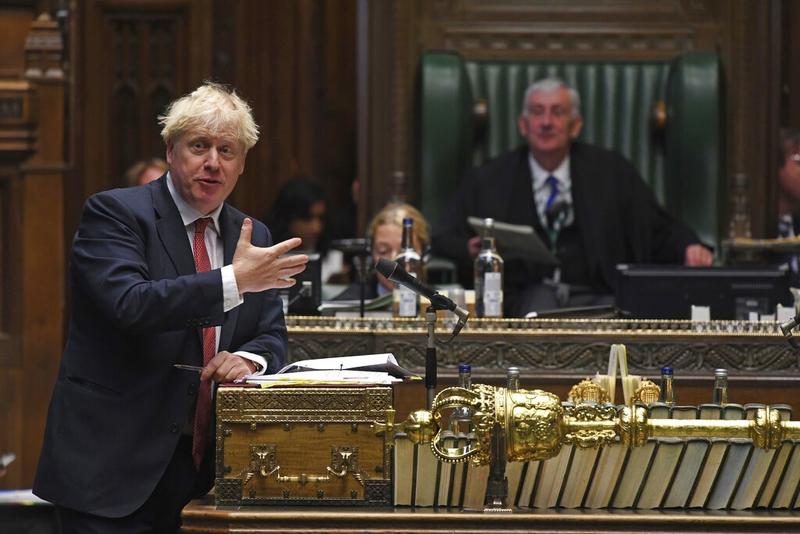 In this photo issued by UK Parliament, Britain's Prime Minister Boris Johnson talks during Prime Minister's Questions in the House of Commons, London, Sept 2, 2020. (PHOTO / AP)
In this photo issued by UK Parliament, Britain's Prime Minister Boris Johnson talks during Prime Minister's Questions in the House of Commons, London, Sept 2, 2020. (PHOTO / AP)
LONDON - Brexit trade talks plunged into fresh crisis on Monday after Britain warned the European Union that it could undercut the divorce deal it signed unless the bloc agrees to a free trade deal by Oct 15.
In one of the most startling turns of the four-year Brexit saga, Britain is reportedly planning new legislation to override parts of January’s Brexit Withdrawal Agreement, potentially jeopardising the treaty and creating frictions in Northern Ireland.
Sections of the internal market bill, due to be published on Wednesday, are expected to “eliminate the legal force of parts of the withdrawal agreement” in areas including state aid and Northern Ireland customs, the Financial Times said, citing three people familiar with the plans.
EU diplomats were aghast, cautioning that such a step would tarnish Britain’s global prestige and heighten chances of a tumultuous EU exit on Dec 31.
Sterling fell around half a percent against the dollar and euro on Monday.
Britain has set a deadline of Oct 15 to strike a deal.
If we can’t agree by then, then I do not see that there will be a free trade agreement between us, and we should both accept that and move on.
Boris Johnson, UK Prime Minister
READ MORE: UK warns EU on Brexit: We won't blink first
“If we can’t agree by then, then I do not see that there will be a free trade agreement between us, and we should both accept that and move on,” Prime Minister Boris Johnson was to say on Monday, according to his office.
Britain left the EU on Jan 31 but talks aimed at clinching a new trade deal before the end of a status-quo transition arrangement in December have so far snagged on state aid rules and fishing.
Without a deal nearly US$1 trillion in trade between Britain and the EU could be thrown into uncertainty with rules over everything from car parts and medicines to fruit and data.
‘Desperate’ strategy?
Some Brexit-supporting members of the ruling Conservatives argue that Britain should denounce the Withdrawal Agreement because, they say, it poses constitutional dangers to Britain even if the two sides secure a future partnership deal.
They refer to article 184 of the agreement binding both sides to using “their best endeavours, in good faith and in full respect of their respective legal orders” to try to secure a future relationship agreement, and argue the EU has not done so.
The reported plan to undermine the Withdrawal Agreement - disclosed on the eve of new talks in London - was condemned by parties on both sides of the Irish border and elicited surprise in Brussels.
“If the UK chose not to respect its international obligations, it would undermine its international standing,” said one EU diplomat. “Who would want to agree trade deals with a country that doesn’t implement international treaties? It would be a desperate and ultimately self-defeating strategy.”
Leaders of Northern Ireland’s Sinn Fein and SDLP parties, the British-ruled region’s two largest Irish nationalist groups, also criticised the government’s plan, as reported by the newspaper.
ALSO READ: No-trade deal Brexit fears rise as talks stumble on state aid
Asked about the report in the Financial Times, British Environment Secretary George Eustice said there might be some minor “legal ambiguities” that needed to be tidied up over the Northern Irish protocol.
“We have a Withdrawal Agreement, and that includes Northern Ireland Protocol, and we are committed to implementing that,” he told BBC radio.
Negotiations were ongoing to “iron out a few remaining technical details” on how the protocol would work and there might then be a need for legislation to provide legal certainty, he said.
“We are not moving the goal posts,” he told Sky News.
EU chief negotiator Michel Barnier acknowledged anxiety but declined to comment on the FT report. “I remain worried ... the negotiations are difficult, because the British want the best of both worlds,” Barnier told France Inter radio.
If no deal is agreed, Britain would have a trading relationship with the bloc like Australia’s, which would be “a good outcome”, Johnson was also to say on Monday.


